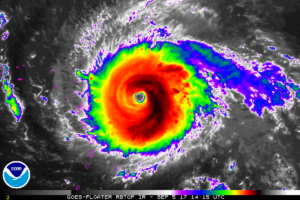By Rose O. Sherman, EdD, RN, NEA-BC, FAAN
 The past two weeks have been a good reminder of how challenging it can be to lead during times of crisis. Nurse leaders in Texas have worked hard to help staff and patients navigate the extremely challenging situations with Hurricane Harvey. Now, nurse leaders in Florida are having the same experience this week with a second potentially catastrophic hurricane, Hurricane Irma. We know from Gallup research done with tens of thousands of followers that the there four things that staff look for from their leaders – especially during crisis times. These qualities that matter most are trust, hope, stability and compassion.
The past two weeks have been a good reminder of how challenging it can be to lead during times of crisis. Nurse leaders in Texas have worked hard to help staff and patients navigate the extremely challenging situations with Hurricane Harvey. Now, nurse leaders in Florida are having the same experience this week with a second potentially catastrophic hurricane, Hurricane Irma. We know from Gallup research done with tens of thousands of followers that the there four things that staff look for from their leaders – especially during crisis times. These qualities that matter most are trust, hope, stability and compassion.
Leadership in a crisis situation is very different from leadership in a time of normal conditions. During a crisis like these hurricanes, staff and leaders confront challenging personal situations at the same time they try to meet the needs of patients. Nurse leaders need to be sensitive to all of the dynamics happening within the organization and to their individual staff. The following are five key actions to remember:
- Be visible and calm – Crisis situations can easily spin out of control. Woody Allen is well known for saying that 90% of life is showing up and this is especially true during crisis times. It is important for the leader to be there, pitch in and to remain calm. This is not the time to focus on completing reports. Nurse leaders need to get out of their offices and be with their staff. Keep them focused on providing care. Staff may be struggling with their personal issues and you need to be there to offer them support.
- Be transparent – A leader must provide direction and respond to the situation in a timely fashion with as much information as is known at the time. Be decisive about what you need to do but don’t over-react in your decision making. The rumor mill goes into high gear during crisis times and it is up to leaders to manage the noise and control anxiety. You can’t over communicate in these situations.
- Be optimistic – Hope is extremely important during catastrophic events. I have been through hurricanes where staff lost everything while they were at work. Acknowledge and don’t minimize what has happened but at the same time, be optimistic. Ask your staff – what can I do to help you right now? Make sure everyone is eating and getting some rest.
- Be grateful – During crisis events, we ask our nurses to leave their families and come to work. Often times, they do so very reluctantly but understand their professional responsibilities. You must be grateful for this and say thank you – frequently
- Be resilient and realistic – When trouble strikes, people want it to be over right now but the lingering effects often last a long time. As a leader, you need to be realistic about the size and scope of the crisis. You don’t want to alarm people, yet do not be afraid to speak to the magnitude of the situation. At the same time, you want to be reassuring that everyone will get through this together. You need to role model resiliency even if you are struggling yourself.
Your leadership will be tested during crisis times and how you react even with the smallest acts of kindness will long be remembered by staff.
© emergingrnleader.com 2017


 LinkedIn
LinkedIn Instagram
Instagram